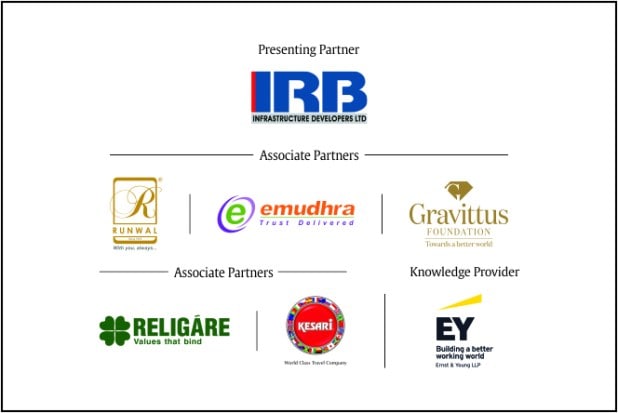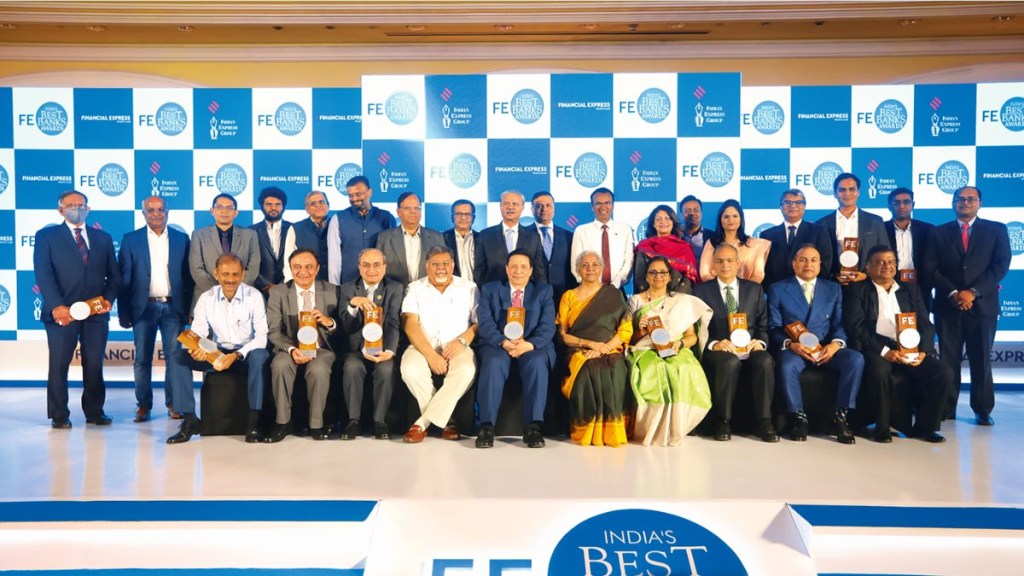Union minister for finance and corporate affairs Nirmala Sitharaman on Friday said that the International Monetary Fund’s (IMF) latest projection of a 7.4% economic expansion for India in FY23 was broadly in sync with the government’s own assessment, but added that given the downside risks from external factors, it was not yet time to drop caution on the growth front.
Speaking at an interactive session moderated by Financial Express editor Shyamal Majumdar, before giving away FE Best Banks Awards here, the minister said robust corporate tax collections were a clear sign that private investment was indeed picking up on the promise of durable consumption demand. The minister also hinted at sustained support to exports, as “these are facing external headwinds” and steps to attract more foreign investments.
“We (want to) draw more (foreign) investments into India so that the growth momentum is not lost. We are definitely working on this,” Sitharaman said.

The minister’s comments come on the back of a recent Reserve Bank of India (RBI) study, which cited capacity utilisation above the critical threshold of 75% to predict a revival of private capex cycle in the quarters ahead.
The minister said rather than the question of what constituted “freebies”, what she was more concerned about was the tendency (among some state governments) to shift the burden of freebies onto “someone else”, like the electricity discoms instead of funding these out of the budgets. Political parties making electoral promises should make adequate budgetary provisions to take care of the expenditures, she iterated.
“It is one thing to empower people and provide them assistance to make sure that they can come out of the mire in which they are and be able to stand on their own. But it’s totally a different thing when you talk about it in the sense of entitlement,” she said.
Also Read| FE India’s Best Banks Awards: Sitharaman says Indian economy to grow at 7.4%
Sitharaman noted that electricity discoms have been seen to bear the brunt of free or highly subsidised power supplies as the subsidies aren’t transferred to them promptly, creating a vicious cycle of payment defaults that cripple the entire power sector.

The contentious issue gathered traction after Prime Minister Narendra Modi last month cautioned against the “revari culture” under which votes are sought by pledging freebies. The Supreme Court has repeatedly expressed concerns over the “the culture of freebies ahead of elections” in recent weeks and has asked the Centre why it couldn’t convene an all-party meet to discuss what constituted freebies and their impact on economy and free and fair polls.
Sitharaman asserted that the finance ministry doesn’t have any plan to impose any charge for UPI (Unified Payment Interface) services and that the concerns of the service providers for cost recovery have to be met through other means. “We see digital payments as a public good. People should be able to access these facilities freely, so that the digitisation of the Indian economy becomes attractive to them. We intend to achieve a higher level of transparency through digitisation. Therefore, we do think it’s not yet time for charging for UPI services,” she said. The minister said if budgetary support to the digital payment ecosystem was found inadequate, it could be addressed separately.
The government has budgeted Rs 1,500 crore each for FY22 and FY23 to compensate for the MDR forgone on UPI and RuPay debit card transactions.
Ahead of the FY23 Budget, the Payments Council of India had requested a Rs 4,000-crore compensation to cover revenue losses worth Rs 5,500 crore on account of the zero-Merchant Discount Rate (MDR) regime.
Watch here
In a discussion paper earlier this month, RBI had sought feedback from stakeholders on the possibility of imposing a tiered charge on the UPI services. However, the central bank later said it had neither taken any view, nor had any specific opinion on the issues raised in the discussion paper.
Asked about her views on a recent RBI article which said big bang privatisation of public sector banks (PSBs) could do more harm than good, the minister said it was clearly a policy matter, which the government would take a call on. “I’m glad that the RBI governor has come out with a clarification on this. Without that, there would have been apprehensions, which I think were uncalled for,” the minister said.
The RBI article said while private sector banks are more efficient in profit maximisation, their public sector counterparts have done better in promoting financial inclusion. RBI later clarified that the views expressed in the article by its researchers don’t represent the central bank’s views.
In its July review of the World Economic Outlook, the IMF trimmed its real growth forecasts for India by 80 basis points each for FY23 and FY24 to 7.4% and 6.1%, respectively, from its April projections. “For India, the revision reflects mainly less favourable external conditions and more rapid policy tightening,” the Fund said. It also said global real GDP growth will drop to 3.2% in 2022 from 3.6% forecast in April, adding that the risks to the outlook are “overwhelmingly tilted to the downside”.
“Our own estimates have also shown based on the developments, that we are definitely at that range (7.4%) and that level will continue even next year,” Sitharaman said.

